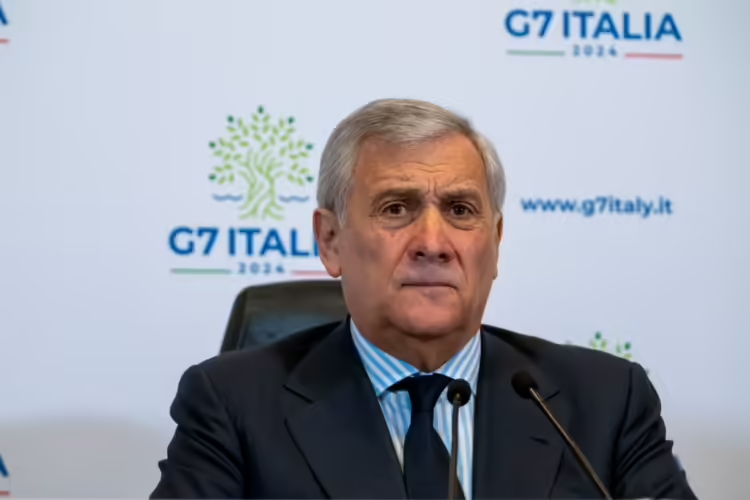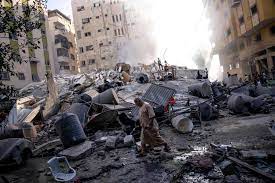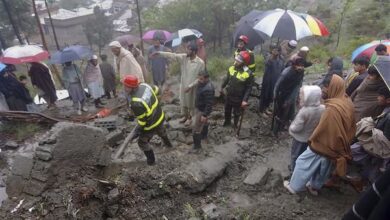While foreign ministers gather in Capri, Italy wants a G7 message to ease tensions in the Middle East
Seven foreign ministers are gathering on the Italian tourist island of Capri, with the main topics of discussion being the ongoing conflict between Russia and Ukraine and the rising tensions in the Middle East.

Following Iran’s historic assault on the Jewish state over the weekend that included hundreds of drones, ballistic missiles, and cruise missiles, the G7 leaders—led by Italy, which is in a rotating leadership role—are anticipated to jointly urge Israel to exhibit caution.
Italian Foreign Minister Antonio Tajani said he had talked with Israel Katz, his colleague in Israel, on Tuesday and encouraged Israel to avert a planned invasion into the southern Gaza city of Rafah in addition to de-escalating any response to Iran’s strike.
“I reiterated this message and I believe that on the occasion of the G7 foreign ministers in Capri, tomorrow and Friday morning, a similar message will be sent,” Tajani said to state-run RAI.
The three-day summit was made much more urgent by Tehran’s strike, because Israel’s conflict in Gaza is already in its sixth month. German Foreign Minister Annalena Baerbock made an impromptu trip to Israel before landing on Capri on Wednesday night.
“We will discuss how a further escalation with more and more violence can be prevented,” she said.
“Because what matters now is to put a stop to Iran without encouraging further escalation,” Baerbock said in support of the imposition of further sanctions on Tehran.
Germany, a steadfast supporter of Israel, has joined the clamor of American and European officials pleading with Israel to refrain from retaliating for Tehran’s strike, which was mostly repulsed with assistance from the United States and its allies.
Russia’s two-year-long conflict in Ukraine is also the main topic of discussion; Dmytro Kuleba, the foreign minister of Ukraine, is invited to the Capri conference on Thursday. He is anticipated to restate his nation’s need for vital military supplies, like as artillery, ammunition, and air defense systems, in order to strengthen its position in the face of Russian advances on the front lines.
As Ukraine runs dangerously low on munitions and American efforts to secure new funding for weapons have stalled in Congress, the United States and several European nations are debating proposals to use the profits from billions of euros of frozen Russian assets to help provide weapons and other funds for Ukraine.
At a conference this Wednesday in Brussels, leaders of the European Union are expected to examine the plan. Meanwhile, Josep Borrell, the head of EU foreign policy, is anticipated in Capri.
In punishment for Moscow’s war on Ukraine, the 27-nation EU is now holding almost 200 billion euros ($217 billion) in assets held by the Russian central bank, the majority of which is frozen in Belgium. According to the bloc, the interest on such money may bring in around 3 billion euros ($3.3 billion) annually.
Additionally, the Biden administration is investigating the potential for using Russian resources. Russian sovereign assets will be one of the topics of discussion at the meeting between the finance ministers of the G7 and U.S. Treasury Secretary Janet Yellen on Tuesday.
She informed reporters in Washington that “we’re looking at a series of possibilities ranging from actually seizing the assets to using them as collateral.”
She expressed concern that Russia may be starting to see indications that the United States and its partners are “weary and finding it more difficult to find ways to support Ukraine” and that Ukraine needs greater assistance.
She said, “That makes us focused on finding a way to unlock economic value and a stream of resources from the Russian sovereign assets” that have been rendered immobile.
The European Central Bank, or ECB, has already issued advisories cautioning against taking control of Russian assets since doing so may erode trust in the EU markets and the euro. However, Borrell has said that only their unexpected profits—not any assets—would be seized under the EU proposal.
Tensions in the Middle East have escalated since the beginning of the most recent Israel-Hamas conflict on October 7, when two terrorist organizations supported by Iran, Hamas and Islamic Jihad, carried out a horrific cross-border assault that claimed 1,200 lives in Israel and abducted 250 more. In response, Israel launched an attack in Gaza that, according to local health professionals, has killed over 33,800 people and left huge amounts of destruction in its wake.
Leaders from across the world have encouraged Israel not to strike back after Iran began a vengeance campaign that brought the Middle East closer to a regional conflict. Less than two weeks had passed since two Iranian generals were slain in an Iranian consulate building by a suspected Israeli strike in Syria.
The G7 leaders had an emergency videoconference on Sunday in response to the Iranian strike, during which they vehemently denounced Iran’s “direct and unparalleled attack against Israel” and reiterated their support for Israel’s security.
Simultaneously, the G7 leaders reaffirmed the need for a “immediate and sustainable cease-fire” and the return of the hostages that Hamas had captured on October 7 in a joint statement, promising to try to avoid a further escalation of tensions in the area.







